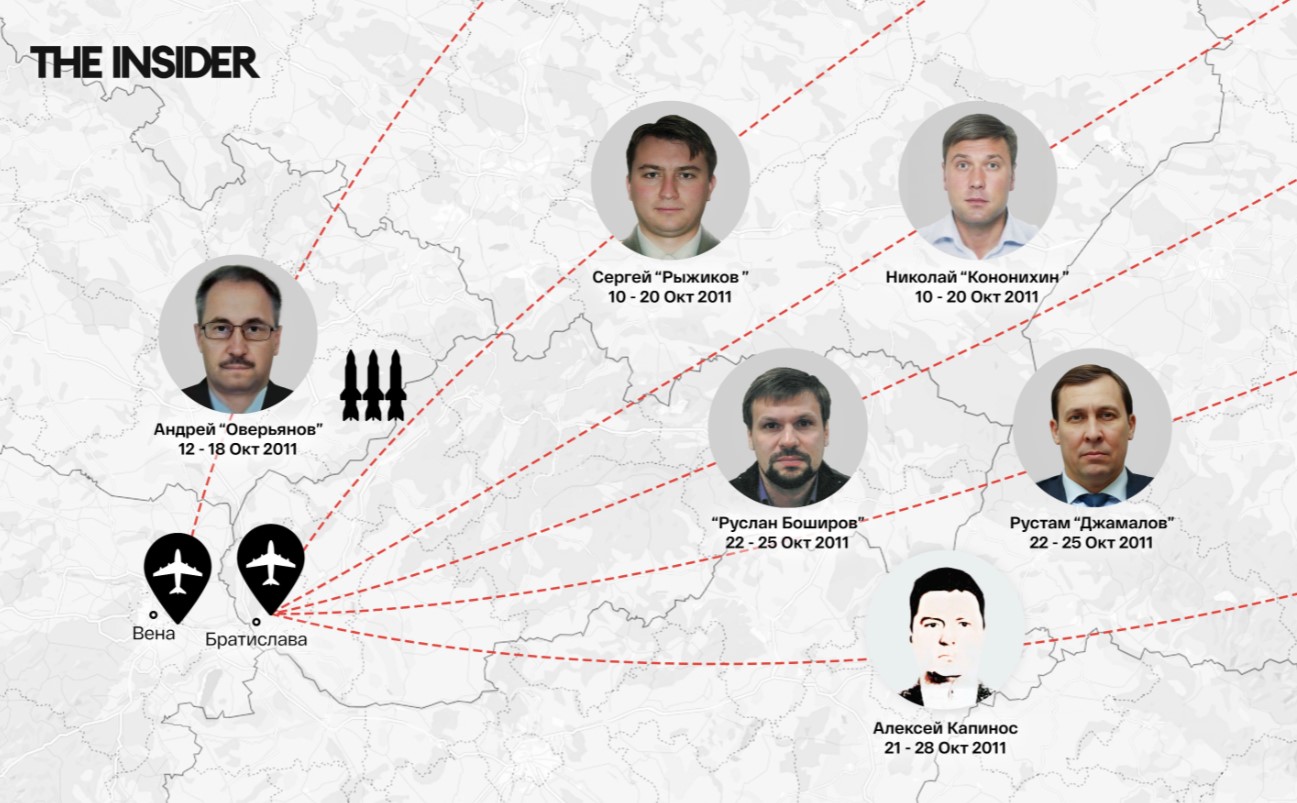
Officers of the Main Directorate of the General Staff of the Armed Forces of the Russian Federation were involved in the explosions at depots in the Czech Republic and Bulgaria.
This is stated in an investigation by The Insider.
One of those involved was tasked with eliminating Ukraine’s political leadership at the beginning of the full-scale Russian invasion.
The GRU Unit 29155, headed by General Averyanov, who came to prominence after the Salisbury poisoning, had been organizing explosions in Europe long before the war against Ukraine began.
The first sabotage attacks were carried out in Bulgaria to prevent the supply of weapons to Georgia. Despite the fact that the explosions resulted in human casualties, the perpetrators were never punished and continued their sabotage activities. Later, as if nothing had happened, they were employed at the Russian presidential administration and since then participated in official events under their real names.

On July 31, 2023, at a roundtable on the last day of the Russia-Africa Summit in St. Petersburg, Russian President Vladimi Putin presented his team of officials to the visiting African leaders. One of them introduced himself as “Averyanov, Andrey – Security.”
Averyanov became famous all over the world as a GRU general who led the same military unit 29155 responsible for the sabotage and Novichok poisoning in Europe. It was his team that poisoned the Skripal family and Bulgarian arms dealer Gebrev. It was his group that organized the explosions at arms depots in the Czech Republic and Bulgaria.
The Insider’s investigators believe that the GRU general’s appearance before African leaders was not accidental. A month later, after a plane with the head of the PMC Wagner Yevgeny Prigozhin and his deputy Dmitry Utkin onboard exploded in the air, General Averyanov, as the deputy head of the GRU, began traveling around Africa and subordinating mercenaries to the GRU. At the same time, exactly two months after the failed coup, Prigozhin’s military empire, once created by the GRU, came under the direct and official control of military intelligence.
As The Insider found out, Averyanov and his subordinates have been organizing explosions in European countries since 2011. At that time, Russia was still a member of the Group of Eight, and all world leaders shook hands with Putin and Medvedev at ceremonial events and discussed the possibility of a visa-free regime.
In 2008, Averyanov was appointed commander of GRU Unit 29155. He recruited several dozen young officers of the GRU and special forces officers. Over time, the unit grew to about 70 people. Its task was to organize sabotage abroad.
GRU officers first put their skills to the test in 2009. The Bulgarian company EMCO bought thousands of Soviet-style artillery shells that were decommissioned by Slovakia in 2009 due to the transition to NATO standards. The GRU was confident that EMCO would sell those shells to Georgia, and after the annexation of Abkhazia and South Ossetia in 2008, Russia feared that Georgia would want to regain its territories.
The 6,000 shells purchased by EMCO were stored in a Czech depot near Vrbětice and were to be shipped to Bulgaria between October 4 and November 4, 2011.
At 9 a.m. on November 12, 2011, the ammunition storage depot located near the Bulgarian village of Lovnidol, where EMCO had stored the 3,120 152-millimeter shells it had recently received from Vrbětice, went up in flames.

Five months after the incident, Bulgarian investigators discovered an unexploded IED approximately 200 meters from ground zero. The retrieved unit was described as “an object resembling plastic explosive, covered with polyethylene wrapping and with an attached aluminum cylinder with exposed wires sticking out.”
The forensic analysis ordered by the police concluded that the improvised explosive device did not fully explode due to the fault in the triggering mechanism.

Not long after the incident, Bulgarian investigators discovered evidence that the massive explosions had been caused by “the embedding of an improvised explosive device.” Nevertheless, three years after the explosions, Bulgarian prosecutors closed the investigation due to an absence of evidence connecting foul play to any perpetrators.
Convinced of their impunity, GRU officers continued operations in Bulgaria and the Czech Republic, resulting in significant civilian casualties.
Less than a year after Lovnidol, another ammunition depot in Bulgaria exploded, where the ammunition intended for export to Georgia had been stored. The explosions were so powerful that the country’s seismic laboratories recorded an earthquake measuring 1.5 on the Richter scale. The Bulgarian prosecutor’s office conducted an investigation for several years but found no evidence of sabotage, so it charged three officers of the depot with negligence.

On March 21, 2015, more than 2,000 rockets and anti-tank grenades intended for export to Ukraine exploded in a depot in Iganovo, near Sopot, home to the country’s largest arms manufacturer.
Before each explosion, it was established that some members of Averyanov’s unit had crossed the border the day before and were in the countries where the explosions occurred.

Despite having been serially compromised by Bellingcat and The Insider for his black-ops activities, only Colonel Vladimir Moiseev remains an active member of Unit 29155. Moiseev was deployed in the early days of the war as part of an advance assassination team in Ukraine seeking to kill Ukrainian political leadership and facilitate the country’s invasion and occupation.
Підтримати нас можна через:
Приват: 5169 3351 0164 7408 PayPal - [email protected] Стати нашим патроном за лінком ⬇
Subscribe to our newsletter
or on ours Telegram
Thank you!!
You are subscribed to our newsletter